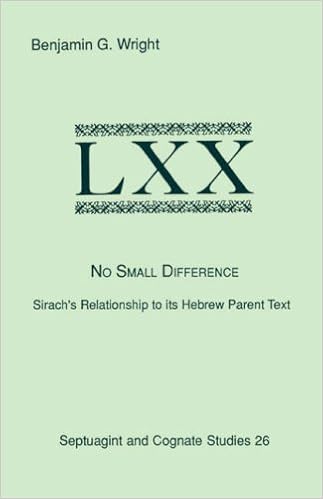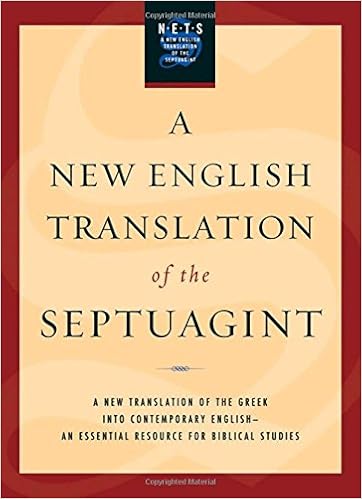 Today I have another opportunity to feature an interview with a well-established Septuagint scholar. If you don’t already know, this is part of a larger running series of interviews that can be found here. This interview is with Dr. Benjamin G. Wright, who is University Distinguished Professor at Lehigh University in Pennsylvania. Wright is well known among Septuagint scholars for many things, most recently his work on Aristeas, Sirach, and also as the co-editor of the New English Translation of the Septuagint (OUP 2007).
Today I have another opportunity to feature an interview with a well-established Septuagint scholar. If you don’t already know, this is part of a larger running series of interviews that can be found here. This interview is with Dr. Benjamin G. Wright, who is University Distinguished Professor at Lehigh University in Pennsylvania. Wright is well known among Septuagint scholars for many things, most recently his work on Aristeas, Sirach, and also as the co-editor of the New English Translation of the Septuagint (OUP 2007).
Now for the interview:
1) Can you describe how you first became interested in LXX studies, and your training for the discipline?
 When I began my graduate studies at the University of Pennsylvania, Robert Kraft [here] and Emanuel Tov [here] had just gotten the initial NEH grant for the Computer Assisted Tools for Septuagint Studies (CATSS) project. I worked on that project for several years, including an exchange year in Jerusalem working with Tov’s side of the project. It was sort of inevitable that some aspect of my dissertation would involve the Septuagint. I became interested in translation and translation technique and how computers might be of assistance in looking at aspects of both. This led to my dissertation on the book of Ben Sira and the translation technique of the grandson.
When I began my graduate studies at the University of Pennsylvania, Robert Kraft [here] and Emanuel Tov [here] had just gotten the initial NEH grant for the Computer Assisted Tools for Septuagint Studies (CATSS) project. I worked on that project for several years, including an exchange year in Jerusalem working with Tov’s side of the project. It was sort of inevitable that some aspect of my dissertation would involve the Septuagint. I became interested in translation and translation technique and how computers might be of assistance in looking at aspects of both. This led to my dissertation on the book of Ben Sira and the translation technique of the grandson.
2) How have you participated in the discipline over the course of your teaching and writing career? (feel free to highlight books here)
 Beyond the usual scholarly activities of giving papers, writings articles, etc., my first book was my dissertation, in which I tried to think about the extent to which one can reconstruct the Hebrew text of Ben Sira where we don’t have it (No Small Difference: Sirach’s Relationship to Its Hebrew Parent Text [SBLSCS 26; Atlanta: Scholars Press, 1989] [here]). This meant thinking about characterizations of translations as literal or free and what that might mean in any given case. More recently I co-edited with Albert Pietersma, A New English Translation of the Septuagint (New York: Oxford, 2007) [here and here].
Beyond the usual scholarly activities of giving papers, writings articles, etc., my first book was my dissertation, in which I tried to think about the extent to which one can reconstruct the Hebrew text of Ben Sira where we don’t have it (No Small Difference: Sirach’s Relationship to Its Hebrew Parent Text [SBLSCS 26; Atlanta: Scholars Press, 1989] [here]). This meant thinking about characterizations of translations as literal or free and what that might mean in any given case. More recently I co-edited with Albert Pietersma, A New English Translation of the Septuagint (New York: Oxford, 2007) [here and here].
Just recently I published my commentary on the Letter of Aristeas (The Letter of Aristeas: ‘Aristeas to Philocrates’ or ‘On the Translation of the Law of the Jews’ [Commentaries on Early Jewish Literature; Berlin: Walter de Gruyter, 2015] [here]). I have been part of the executive committee of the International Organization for Septuagint and Cognate Studies (IOSCS), the premier professional organization for those studying the Septuagint, in various capacities—at-Large Member, Secretary, Vice-President, and President—since 1991. In 2010 I gave the Jeremie Lecture in Hellenistic Judaism and Septuagint at the University of Cambridge, and in 2013 I led the Septuagint Summer School in Göttingen [see, e.g., here] on the topic of the book of Ben Sira. I have tried to bring the Septuagint more into the view of the general public as well. For example, I did an hour interview on our local public radio station on the Septuagint.
3) How have you integrated LXX studies into your work as a professor?
This has been a tough issue. I teach in a department that is undergraduate only, and in general students take our courses as general distribution courses and the like. This means that I do not get students who know Greek and Hebrew. So, generally, I always have a section on the Septuagint in my Hebrew Bible/Old Testament, Christian Origins, and Judaism in the Greco-Roman World course, especially as it pertains to translation as an act of interpretation. I also include discussions of translation, since that is an issue that students often do not have to confront when they read their translated texts. I have also been fortunate to have been asked to participate as an outside reader or external examiner for a number of Ph.D. theses. I admit that I look forward to these opportunities.
4) How has the field changed since you’ve been involved?
 The field has changed dramatically, since I first entered it as a graduate student. Take for starters the fact that when I began graduate school in the late 1970s there were no contemporary translations of the LXX corpus into modern languages. Now we have English, German, French, and a Spanish project [see here]. The interests of the field have changed considerably as well. Of course, the Septuagint still occupies an important place in the textual criticism of the Hebrew Bible, but interest in the Septuagint as a corpus of documents that can tell us about Judaism in the Hellenistic period has expanded tremendously. So, now we debate issues such as whether we can talk about a theology of the Septuagint or what constitutes exegesis in the translations. Interest in the Septuagint has clearly moved beyond a small cadre of experts and into the field of Early Judaism more generally. This is all to the good. On the other side of the coin, however, is that this corpus of translations can be very difficult to work with, and sometimes folks do not get up to speed sufficiently in Septuagint Studies to understand the complications of using the Septuagint. Moreover, some of the traditional departments where study of the Septuagint flourished are now gone. I think mostly of the University of Toronto, where John William Wevers and Albert Pietersma [here] taught for years. In North America Trinity Western University in the Vancouver area has established the John William Wevers Institute for Septuagint Studies, which has connected with it some fine Septuagint scholars. In Europe there is the Centre for Septuagint Studies and Textual Criticism at the Katholieke Universiteit Leuven.
The field has changed dramatically, since I first entered it as a graduate student. Take for starters the fact that when I began graduate school in the late 1970s there were no contemporary translations of the LXX corpus into modern languages. Now we have English, German, French, and a Spanish project [see here]. The interests of the field have changed considerably as well. Of course, the Septuagint still occupies an important place in the textual criticism of the Hebrew Bible, but interest in the Septuagint as a corpus of documents that can tell us about Judaism in the Hellenistic period has expanded tremendously. So, now we debate issues such as whether we can talk about a theology of the Septuagint or what constitutes exegesis in the translations. Interest in the Septuagint has clearly moved beyond a small cadre of experts and into the field of Early Judaism more generally. This is all to the good. On the other side of the coin, however, is that this corpus of translations can be very difficult to work with, and sometimes folks do not get up to speed sufficiently in Septuagint Studies to understand the complications of using the Septuagint. Moreover, some of the traditional departments where study of the Septuagint flourished are now gone. I think mostly of the University of Toronto, where John William Wevers and Albert Pietersma [here] taught for years. In North America Trinity Western University in the Vancouver area has established the John William Wevers Institute for Septuagint Studies, which has connected with it some fine Septuagint scholars. In Europe there is the Centre for Septuagint Studies and Textual Criticism at the Katholieke Universiteit Leuven.
5) For the benefit of graduate students who are potentially interested in LXX studies in doctoral work, what in your opinion are underworked areas and topics in need of further research?
I think that we need to continue the integration of the Septuagint into the larger study of Second Temple and Hellenistic Judaism as well as the Hellenistic World at large (since the Septuagint is also a collection of Hellenistic Greek documents). This will require students to know not only the Septuagint but a wider range of issues within the study of Early Judaism and the Hellenistic Mediterranean. Certainly more work needs to be done integrating the modern field of Translation Studies into the study of the Septuagint. While there have been notable moves in that direction—and here I think of Cameron Boyd-Taylor and Theo van der Louw, for example—much remains to be done, since the objects of our study are translations, and until now, I think that Septuagint Studies in an under-theorized field.
6) What current projects in Septuagint are you working on?
 After my Aristeas commentary, I am beginning a commentary on the book of Ben Sira for Hermeneia that will likely take me the remainder of my scholarly career. This will be a huge project, and I hope I have enough time and momentum to complete it. Insha’allah, I will. I am also working with Albert Pietersma and Cameron Boyd-Taylor on a second edition of the NETS translation. Finally, I am working on Ben Sira for the SBL Commentary on the Septuagint Series [here].
After my Aristeas commentary, I am beginning a commentary on the book of Ben Sira for Hermeneia that will likely take me the remainder of my scholarly career. This will be a huge project, and I hope I have enough time and momentum to complete it. Insha’allah, I will. I am also working with Albert Pietersma and Cameron Boyd-Taylor on a second edition of the NETS translation. Finally, I am working on Ben Sira for the SBL Commentary on the Septuagint Series [here].
7) What is the future of Septuagint studies?
I have been greatly heartened by a number of young scholars who are interested in the Septuagint and related fields. I expect that the centers at Trinity Western and KU Leuven will continue to train students in Septuagint. If one simply scans the programs of the SBL, the IOSOT and other large professional conferences in addition to the annual meetings of the IOSCS, the number of papers featuring topics and issues in Septuagint Studies looks to be very healthy.
Wrapping Up
Thanks to Dr. Wright for his willingness to contribute to this series, and more importantly for his longstanding presence and efforts in the discipline of Septuagint scholarship. More interviews will follow in due course!
Reblogged this on Talmidimblogging.
Reblogged this on Zwinglius Redivivus and commented:
Very much worth your time.